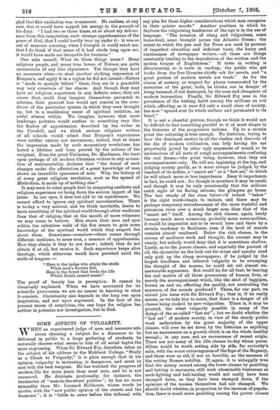One asks oneself, What do these things mean ? Many
religious people, and many true lovers of Nature, are quite unconscious of any like experience. Yet though they have no moments when—to steal another striking expression of Bunyan's, and apply it in a region he did not intend—Nature is "made to spangle before" them, they are in a peaceable way very conscious of her charm. And though they may have no religious experience in any definite sense, they are aware that, could they imagine themselves perverted to atheism, their greatest loss would not consist in the over- throw of the particular system in which they were brought up, but in a maddening sense of spiritual isolation, an awful silence within. We imagine, however, that most landscape painters would confess to something very like the flashes of apprehension described by the writer in the Cornhill, and we think serious religious writers of all schools would admit that Bunyan's experiences were neither untrue nor uncommon ; indeed, that at times the impression made by such momentary revelations has lasted a lifetime and been proved by the actions of the recipient. Even the great Unitarian, Dr. Martineau, the least open perhaps of all modern Christian writers to any accusa- tion of sentimentality, declares that "the denial of such changes under the affectation of a great knowledge of man shows an incredible ignorance of men. Why, the history of of every great religious revolution, such as the spread of Methodism, is made up of nothing else."
It may seem to some people that in comparing aesthetic and religious experience we bring down the serious import of the latter. In our eyes, it does but add to its significance. We cannot afford to ignore any spiritual corroboration. There is to-day a very natural, and we think inevitable, desire to learn something of the spiritual world through other mediums than that of religion, that at the mouth of more witnesses we may come to believe. Men strain their ears and eyes within the relentless walls of the five senses to gain some knowledge of the spiritual world which they suspect lies about them. Sometimes—somehow—there comes through different mediums, to some men, a measure of apprehension. How they obtain it they do not know ; indeed, they do not obtain it at all, but receive it. Such experience keeps alive theology, which otherwise would have perished amid the strife of tongues :— "Here is the judge who stints the strife When men's devices fail, Here is the bread that feeds the life Which Death cannot assail."
The proof of beauty lies in perception. It cannot be chemically explained. When we have accounted for its
scientific phenomena we are no nearer to knowing in what it consists. Christianity also depends in the long run upon inspiration, and not upon argument. In the face of the present storm of scepticism, the one hope for religion lies neither in polemics nor investigation, but in God.
SOME ASPECTS OF VULGARITY.
wHEN an experienced judge of men and manners sets about choosing a subject for a discourse to be delivered in public to a large gathering of students, he naturally chooses what seems to him of all social topics the most engrossing. When Sir Edward Fry, therefore, takes as the subject of his address to the Birkbeck College, "Study as a Check to Vulgarity," it is plain enough that in his opinion vulgarity is increasing, is dangerous, and must be met with the best weapons. He has watched the progress of modern life for more years than most men, and he is not reassured. He distrusts profoundly, for instance, the tendencies of "man-in-the-street politics "; he has no more sympathy than Mr. Leonard Hobhouse, whose words he quotes, with the "new public opinion of the streets and the tramcars" ; it is "futile to come before this tribunal with
any plea for those higher considerations which men recognise in their quieter moods." Another province in which he deplores the vulgarising tendencies of the age is in the use of language. "The invasion of slang and vulgarisms, some home-bred, some brought across the Atlantic Ocean; the extent to which the pen and the Press are used by persons of imperfect education and deficient taste, the hurry and carelessness of newspaper writers,—all these are things constantly tending to the degradation of the written and the spoken tongue of Englishmen." If taste in writing is deteriorating, so is taste in reading; the public who get books from the free libraries chiefly ask for novels, and "a great portion of modern novels are trash." As for the charm of scenery, or respect for places consecrated by the memories of the great, both, he thinks, are in danger of being lessened, if not destroyed, by the ease and cheapness of modern locomotion. Finally, Sir Edward Fry sees in the prevalence of the betting habit among the millions an evil which, affecting as it once did only a small class of society, has now "spread over its whole surface and permeated to its heart."


























































 Previous page
Previous page